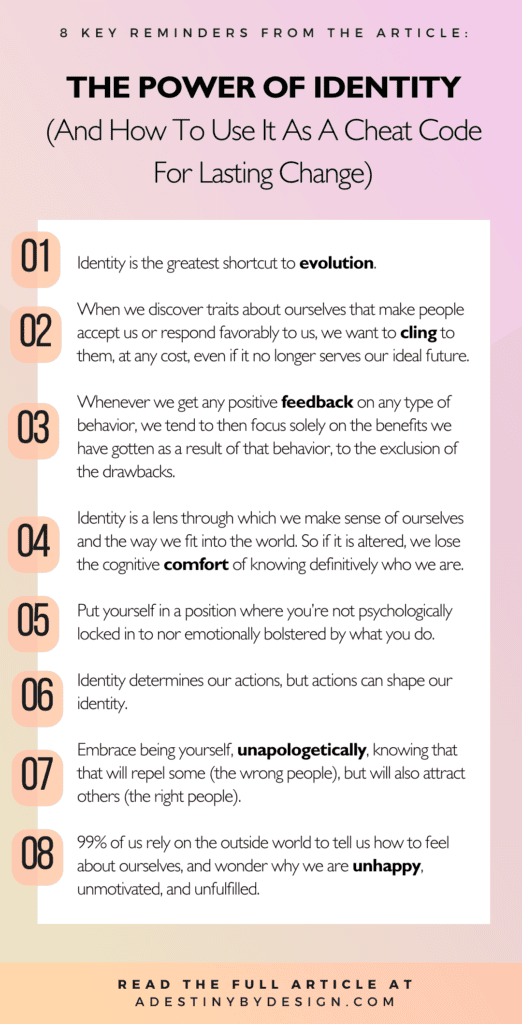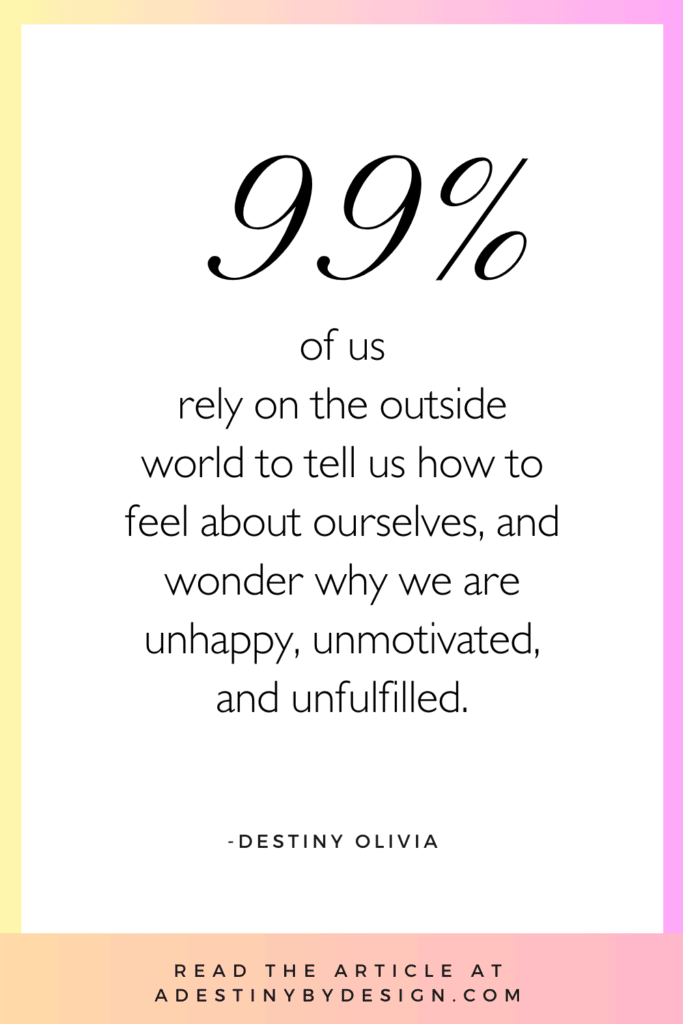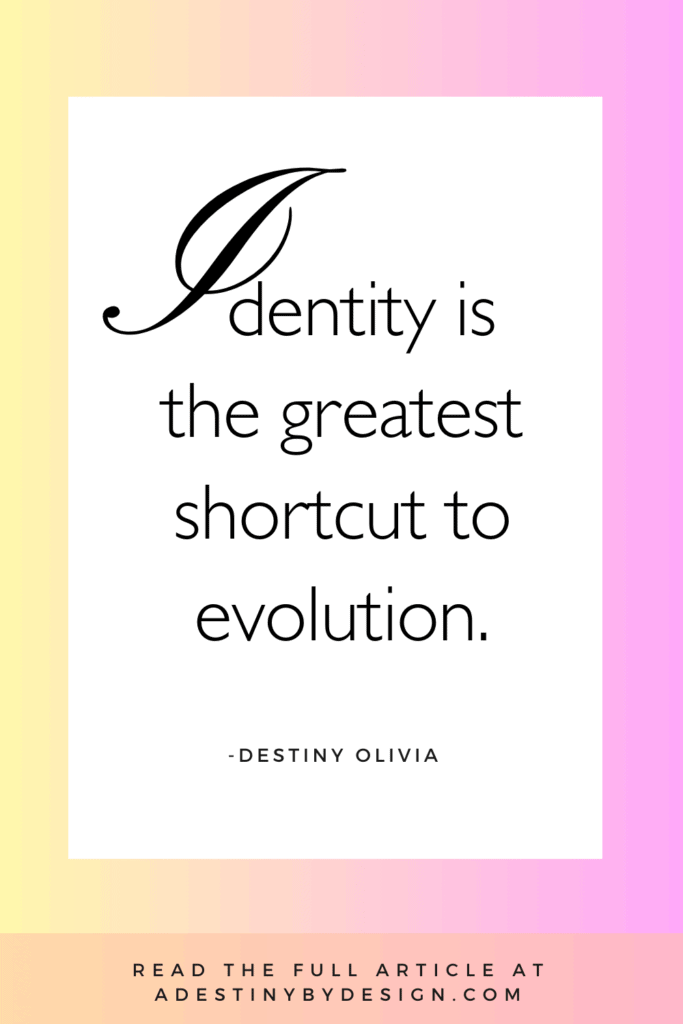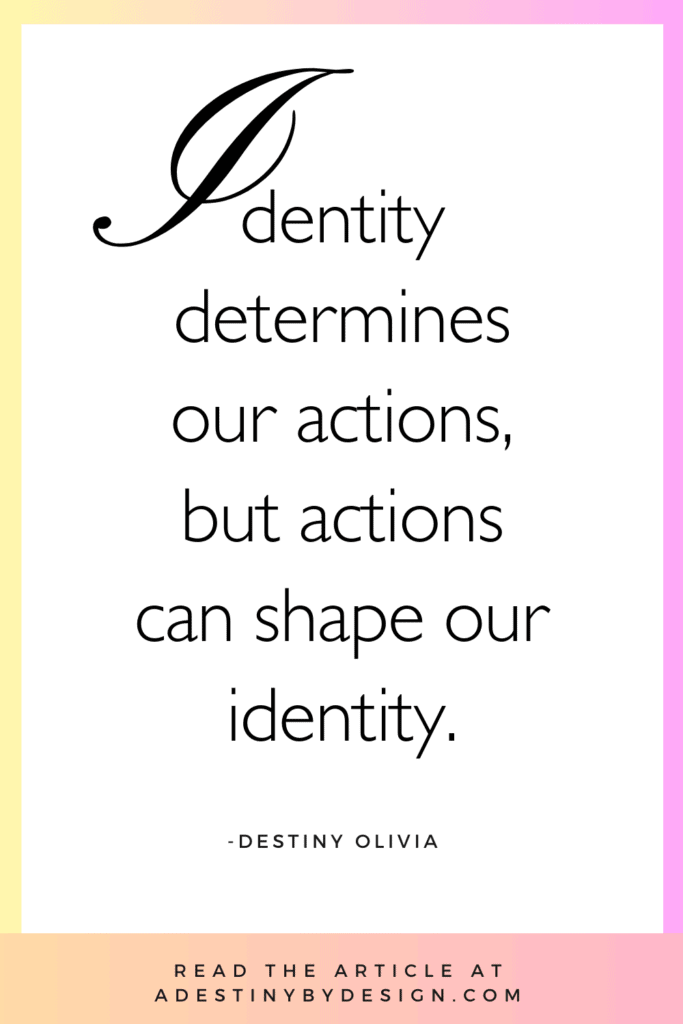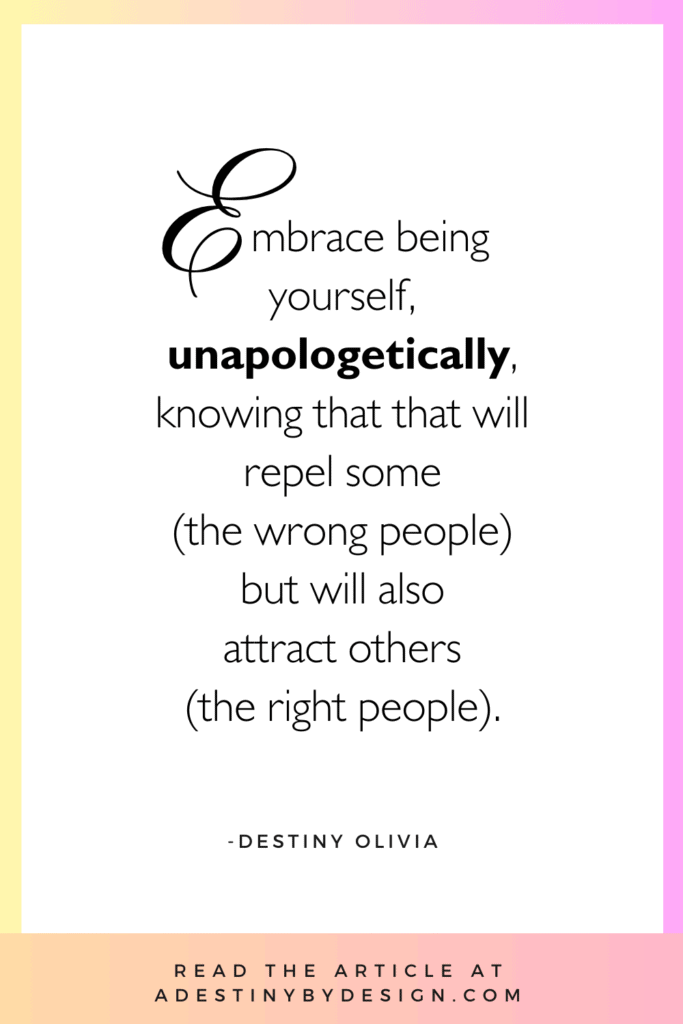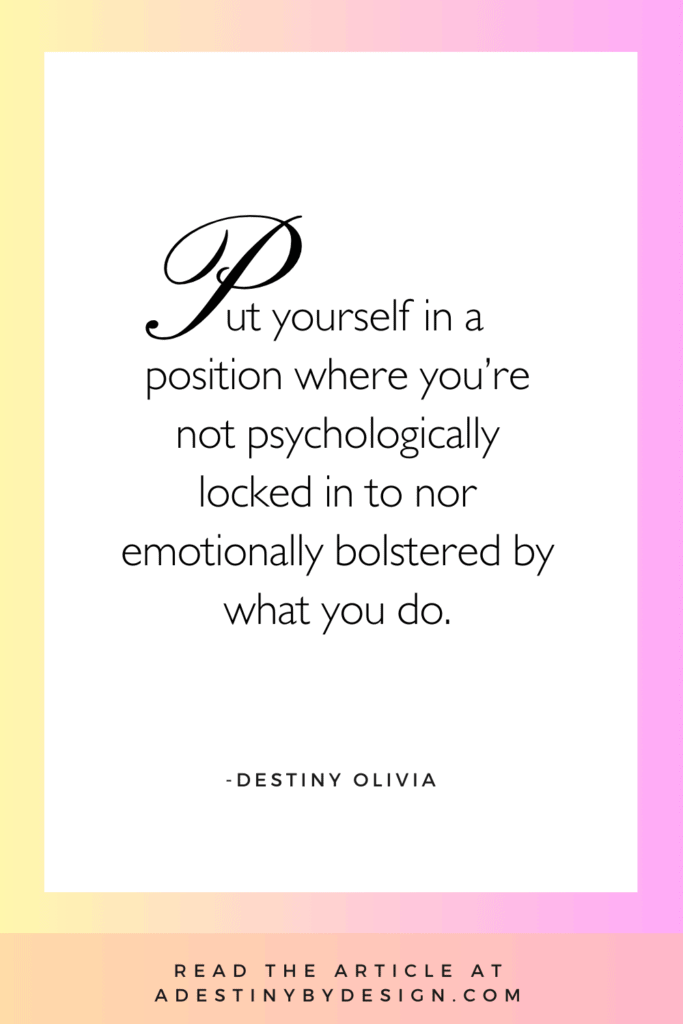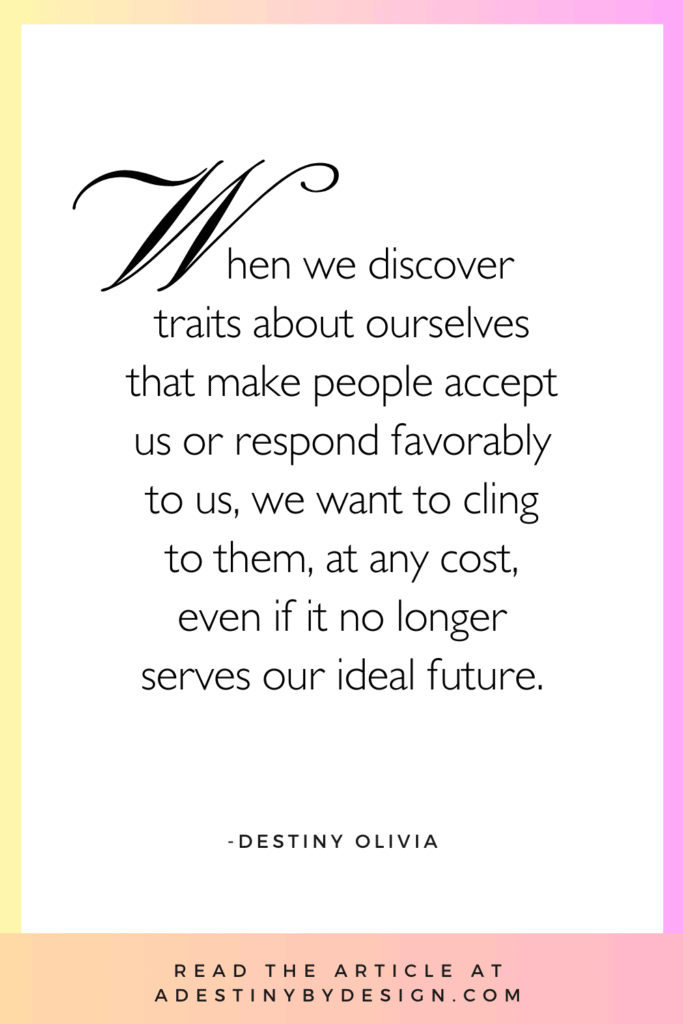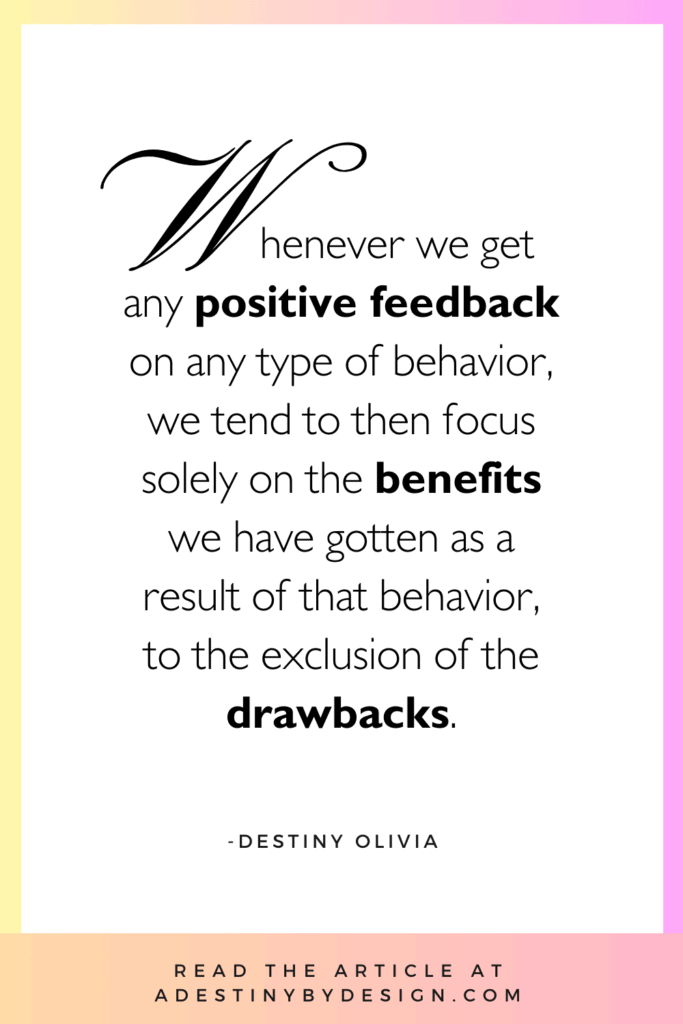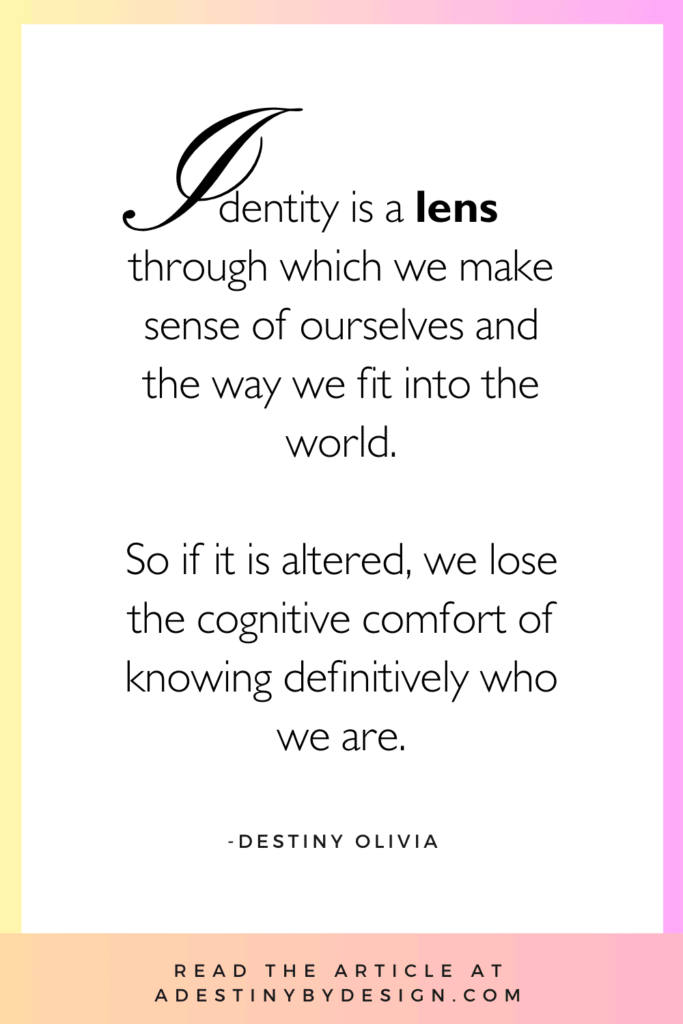The Power of Identity (And How To Use It As A Cheat Code For Lasting Change)

Any time is a good time to make goals if you ask me.
But the beginning of the year marks a special season of hope and anticipation that has everyone (even people who are not goal freaks like me) taking note of the things they want to accomplish in the near future.
Most people, when making goals, just stop at asking themselves:
“What do I want to achieve?”
But when you are aware of the power of identity, you also ask yourself:
“What kind of person would I have to be in order to achieve this?”
Identity is the greatest shortcut to evolution.
It’s the easiest impetus for action.
It eliminates your need for motivation, making discipline effortless.
You don’t have to feel like working out every day if you have decided you are the kind of person who works out every day.
You don’t have to struggle to abstain from sugar if you have decided you are the kind of person who eats healthy.
You don’t have to force yourself to write every day if you have decided that you are a writer.
Identity removes the need for permission from your emotions in order to act.
Your identity dictates your actions.
And your actions dictate your outcomes.
We rarely outperform our identities.
This is good, if you have chosen your identity deliberately to be in line with the kind of person you want to be, the kind of things you want to accomplish, and the kind of life you want to have.
This is bad, if like 99% of people, you unconsciously inherit your identity from factors outside of you, and because of the influence of your default environment, you remain stuck in a cycle of thoughts and actions that do not serve your best interest or your highest potential.
PSST–
Before we continue, I just released a new book I think you’ll like called…
Challenge Accepted: 15 Powerful Principles to Overcome Limiting Beliefs, Unlock Your Potential, & Change Your Life
The title says it all. Check it out here and make 2024 your year–hey, that rhymes!
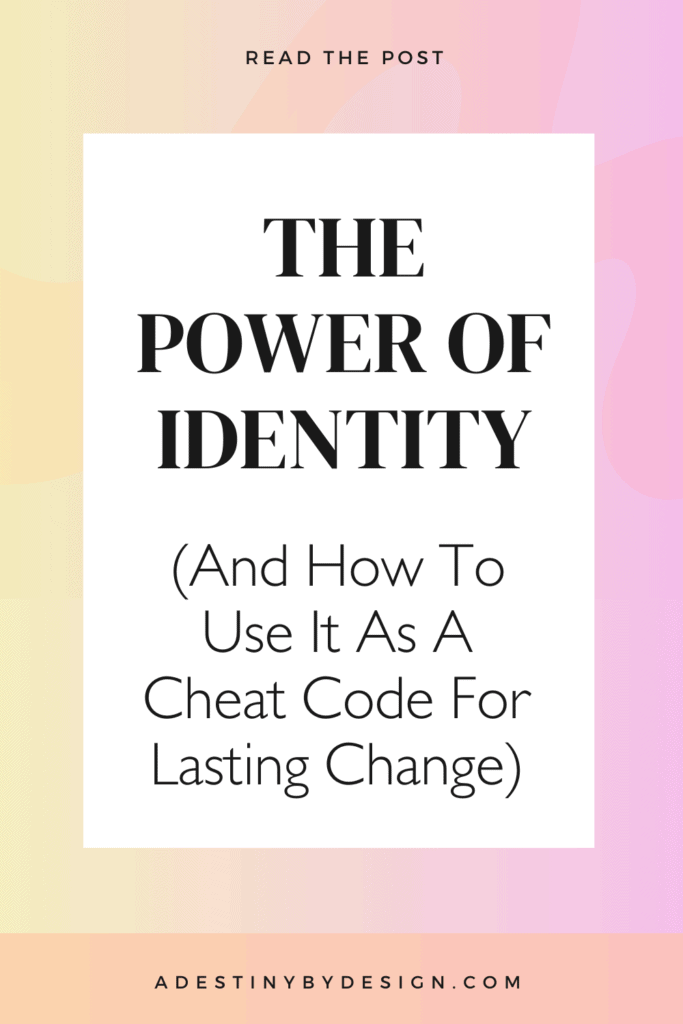
Where does our identity come from?
10 Components of Identity:
Roles – The roles we play in other people’s lives. Mother, sister, wife, boss, caregiver, etc.
Upbringing – The way we were raised that has impressed upon us a set of default habits and a default belief system.
Beliefs – Our paradigm of the world, how it works, and where we fit in it. This is heavily influenced by upbringing.
What we produce – Our work, our accolades, our income, etc.
External traits – Long hair, six pack abs, skin color, everything pertaining to how we look.
Internal traits – Aspects of our personality. Whether we are analytical, perfectionistic, creative, bougie 👀, etc.
Status signals – The things we display outwardly that people judge us on for better or worse. The clothes we wear, the car we drive, the house we live in, etc.
Feedback – The way we are treated by others. If you are bullied, coddled, complimented, etc. What we produce, traits, and status signals influence this heavily.
Habits – Things you automatically do on a recurring basis, whether good or bad. Running, smoking, etc.
Social Fit – The way other people expect you to be. The girl who always has a boyfriend, the world traveler, the life of the party, etc.
When you add all these things together, you end up with something that cumulatively makes up the way others perceive you and the way you perceive yourself.
When we set out to form our identity with intention, we can start to pull these levers and decrease the impact some of these sources have, and use behavior change to increase the impact that others do.
Why is identity so hard to change?
While identity is the greatest shortcut to evolution, unfortunately, it is also the greatest ally to stagnation for several reasons.
We want to belong.
The aspects of our identities that affect how we look in the eyes of other people are the hardest to change because it is a natural human desire to belong.
We instinctively want to be accepted by “the tribe” so we get locked into being a certain version of ourselves–the version that got positive feedback from others.
If you’re looked up to by your friends and known as the girl who always has a boyfriend, you’re going to try your best to never be single, no matter what.
If everyone expresses how they always want you around and you’re known as the “life of the party,” you’re going to always try to be “on,” no matter what.
You don’t want to let others down or lose your favorable social standing, so you behave in line with the most widely accepted version of yourself.
When we discover traits about ourselves that make people accept us or respond favorably to us, we want to cling to them, at any cost, even if it no longer serves our ideal future.
Any change would be happening at the risk of exclusion from the group.
Our existence is at stake.
By equating the components of our identity to who we are, any threat to that is a threat of death.
It is perceived as being the same severity of a threat to our actual, physical lives, because it signals the death of a persona, of our idea of who we are.
But it is really a threat to the ego.
A threat to our identity feels like a threat to our existence.
The inherent dichotomy of character traits.
Every positive has a negative.
And every negative has a positive.
Your best traits are also your worst.
The difference is a matter of context.
For example:
- Being logical can serve you well in one arena, but not another.
- Being assertive can be great at work, but bad at home.
It’s also a matter of spectrum.
Being a self-proclaimed perfectionist is good up to the point where you take pride in completing projects with excellence, but bad at the point where you never complete or release any projects at all due to crippling self-doubt.
To a degree, any trait can be good.
But for every trait, there is a line at which good turns to bad.
We hold on to traits for only focusing on the good.
(We do this with relationships as well, actually. 😬)
Whenever we get any positive feedback on any type of behavior, we tend to then focus solely on the benefits we have gotten as a result of that behavior, to the exclusion of the drawbacks.
We want to stay in our cognitive comfort zones.
The brain is always looking for shortcuts to process and categorize information.
Who could blame it?
The thing runs nonstop, 24/7/365, no breaks, no holidays, for up to 100+ years.
To threaten our identity is to dismantle the cognitive casing that is holding us together.
Without it, we become without form, and everything falls apart.
Identity is a lens through which we make sense of ourselves and the way we fit into the world. So if it is altered, we lose the cognitive comfort of knowing definitively who we are.
4 Simple ways to tap into the power of identity to use it in your favor
Here are 4 simple ways to change your identity:
01 / Separate who you are from what you do.
When you do this, the power the ego feels from claiming “titles” or accolades is taken away.
This gives you the flexibility to change deliberately when it makes sense, and also makes you more adaptable to change when it is inevitably thrust upon you involuntarily.
If you identify as a bachelor and you meet an incredible potential partner and start to fall in love, you will feel more resistance to exploring the new relationship, even though it could be the next best thing that could happen for you.
If you identify as a football player, and you get a career-ending injury, you’re going to have an especially tough time transitioning into the next stage of your life.
There’s a big psychological difference between being a football player and being someone who plays football.
Put yourself in a position where you’re not psychologically locked in to nor emotionally bolstered by what you do.
02 / Selectively cling to traits.
Everything has its caveats.
There will be some instances where claiming a title helps you rather than hurts you.
There’s a fine line.
Make sure you’re treading it deliberately.
If it helps you, for instance, to identify as a writer because it helps you create the habit of writing daily, great.
Only claim titles to the extent that it is beneficial to you and your goals.
It’s also helpful to cling to titles or traits that have benefits that overflow positively into every area of your life, no matter how your life might change.
For example, being a healthy eater will always be of benefit to you, no matter what stage of life you are in or how your life goals evolve over time.
On the other hand, being a bachelor or full-time traveler, may not always benefit you because there may come a time when that identity will be in conflict with a new direction you want to take in your life, and your attempt to cling to the identity could make you inflexible to the point of your own detriment.
Choose to cling to timeless traits that can go with you and grow with you, no matter what.
Choose what’s worth clinging to and eliminate what’s not.
03 / Introduce new information.
Identity determines our actions, but actions can shape our identity.
So, if you want to change your identity, taking new actions is a prime way to do so.
By taking different actions, you introduce yourself to the possibility of forming different habits, and getting different results, both of which grant you new information from which to form your identity.
While being presented with new evidence of what you can now do, your mind will have no choice but to form a new self-perception around your newly created reality, making it even easier for you to continue taking action in the right direction.
04 / Decide who you are based on who you want to be.
It is YOU who has to contend with the outcomes of your one and only life.
Not the people you fear will criticize you.
It is YOU who has to wrestle with inner feelings of inauthenticity.
Not the people you fear will criticize you.
It is YOU who has to live with the consequences of failing to reach your potential.
Not the people you fear will criticize you.
It’s okay to do what you want to do and pursue what you want to pursue.
You are an individual.
Embrace being yourself, unapologetically, knowing that that will repel some (the wrong people), but will also attract others (the right people).
Give yourself permission to be who you are and pursue who you want to be, without regard to the opinions of others.
Identity is how we decide who we are, what we are capable of, and what we deserve.
That’s why it’s so important.
99% of us rely on the outside world to tell us how to feel about ourselves, and wonder why we are unhappy, unmotivated, and unfulfilled.
While identity is by default created from the outside in, it can be altered from the inside out by you choosing to think differently about your actions and the parts of you that you consider “you.”
Here’s to creating your identity on your terms and tapping into the greatest shortcut for making positive, sustainable change.
If you’re looking for further reading to help you grasp the power of identity and re-create a new one, check out the book Psycho-cybernetics (one of my top 10), and my book, Challenge Accepted.
P.S. Pretty sure I used the word “identity” in this article more times than I’ve used it in my entire life. 😅 Please forgive me.
If you enjoyed reading this article as much as I enjoyed writing it…
Every new subscriber gets a free habit tracker & you’ll never miss another mindset shift! It’ll be your favorite email you get every week 😊

